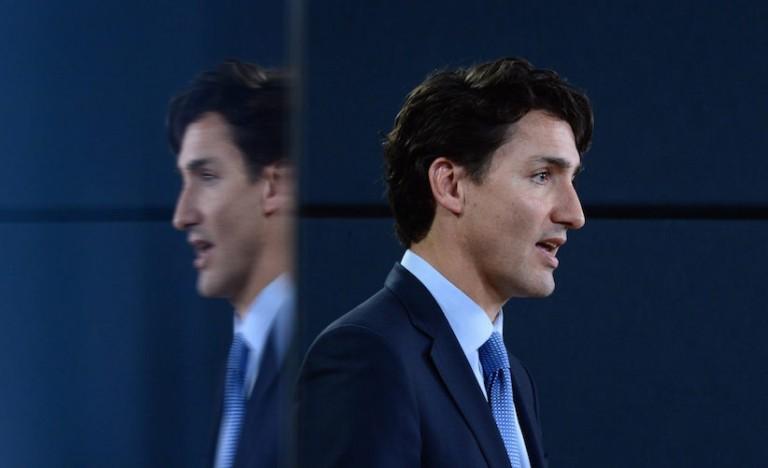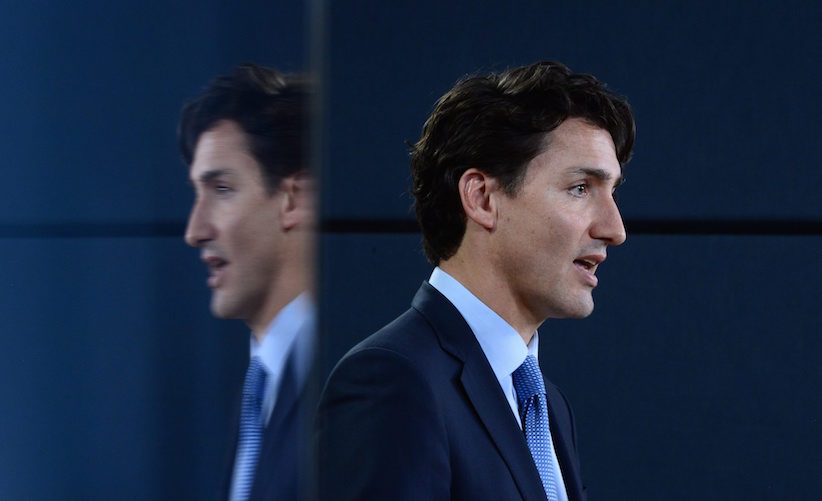Trudeaumania Two is starting to fade
With polls sagging, the Trudeau Liberals are stumbling badly on a number of key fronts. Enter Jagmeet Singh, stage left.

Prime Minister Justin Trudeau holds a press conference at the National Press Theatre in Ottawa on Tuesday, Nov. 29, 2016. Trudeau is approving Kinder Morgan’s proposal to triple the capacity of its Trans Mountain pipeline from Alberta to Burnaby, B.C. — a $6.8-billion project that has sparked protests by climate change activists from coast to coast. THE CANADIAN PRESS/Sean Kilpatrick
Share

On Oct. 1, 1972, former prime minister Pierre Trudeau joined 10,000 fans and greeted Team Canada as its players arrived home from the Soviet Union. The country was wallowing in Cold War pride in the wake of the miracle victory in the Summit Series. After a near-death experience—down 5-3 in the third period of the eighth game—Team Canada’s astonishing three-goal comeback was sealed by Paul Henderson’s iconic shot. What Trudeau didn’t know as he stood at Dorval airport was that, 29 days later, in the election of 1972, he would also have a near-death political experience followed by something of a miracle comeback. More than the Summit Series, this is the 1972 event the current Liberal government ought to remember right now, as the political landscape starts to shift and they look ahead to the next election. It can all slip away so fast.
Obviously none of this is lost on Justin Trudeau. He appreciates how his father’s much mythologized Trudeau-mania of 1968 dissipated in four years, diminished by a weak economy, the strong NDP leadership of David Lewis, and finally by a listless campaign. By election night on Oct. 30, it appeared Pierre Trudeau had lost. He was about to be a one-term wonder. Some speculated that Robert Stanfield’s Progressive Conservatives had actually won, but the counting continued into the next day, Halloween, and it proved to be a cruel trick. Trudeau won by two measly seats, 109 ridings to Stanfield’s 107. Two seats. The Liberals had won 155 in 1968. David Lewis and the NDP became kingmaker, working with Trudeau to sustain a minority government. Trudeau was humbled into philosophical clichés. “Whether or not it is clear to you,” he said at a drained press conference, “the universe is unfolding as it should.”
For Trudeau number two, the once-sunny universe is suddenly not unfolding as it should—or at least, as it has been unfolding for the last two years. The polls are starting to sag as his government mishandles key files like tax reform, Netflix, pot and pipelines in a shockingly sloppy way. After two high-flying years, it’s like watching a world-class golfer get the yips. They can’t steady their hands and make the shot. Especially Finance Minister Bill Morneau.
RELATED:
Reeling under attacks over his hazily framed proposal to close corporate tax “loopholes”—a word the embattled finance minister will likely never use again after farmers, doctors and small-business groups turned it into a foul expletive—the government is desperate to find a fix. It is not good PR when farmers and doctors believe they are being called tax cheats. Unfortunately, a second tax front opened on Thanksgiving, after a report in The Globe and Mail revealed that the government is planning to count employee discounts enjoyed by people like retail-store workers as a form of taxable benefit. Cue the retail sector outrage.
By Tuesday the government was scrambling to do damage control, announcing they are not “targeting” the retail sector, even though CRA guidance clearly suggests they should. The government’s message got muddier Tuesday night with its suggestion that the laws governing the Income Tax Act have not changed and so must be enforced—which means employee discounts will be hit—yet it also tried to reassure everyone again that nothing will change. Huh? Not sure anyone is reassured after that.
Employees view these discounts, if they are under a certain threshold, as incentives in exchange for low wages, while small-business owners often use them as hiring inducements. Even if raw financial logic and the Income Tax Act on this are sound—and they are—the political optics are brutal. The Liberals still might find a way to discard the employee benefit story as the musings of an overzealous bureaucrat at Canada Revenue Agency—something they are trying actively to do—but they’ve nevertheless handed the opposition another weapon.
Andrew Scheer, the new Conservative leader, is already using the “loophole” issue to introduce himself to Canadians as a low-tax defender of small business—right on the Blue brand. He’s also cleverly deployed the one-man rat pack, Pierre Poilievre, to gnaw at Morneau’s polished leather shoes. It’s perfect casting. Poilievre long ago embraced the role of Parliamentary Pest and he plays it with the self-satisfied glee of Templeton in Charlotte’s Web. All the vaporous characteristics that made him such a maddeningly obstructive member of government are brilliantly useful in opposition. He’s driving the befuddled Liberal finance minister mad and stealing the parliamentary show.
RELATED: Bill Morneau faces a backlash about tax breaks, not hurt feelings
Fundamentally, the Liberals keep failing to frame the tax issue to their advantage, which is surprising because it once worked so well for them. Their most popular promise during the last election campaign was taxing the richest one per cent. It polled through the roof. Progressives saw it as a genuine tack towards fairness and it helped pry voters from the NDP. But in that case there was a real target: the one per cent. The rich. Easy to understand. In this case, there is no clear target, or not one Morneau can easily and simply articulate. Who’s really going to be hit by closing these corporate “loopholes”? What the hell is income sprinkling, anyway? In politics, explaining is losing, and this has become a loser.
Morneau clings to the substance of what the government wants to do—go after people who make more than $150,000, who have already maxed out their RRSP and their Tax Free Savings account, and who are paying their kids dividends from their personal companies. But at town-hall meetings he gets shouted down, and you can see his frustration as his point keeps getting lost. But if he can’t frame the issue, why should he blame the opposition if they want to frame it for him? He keeps blithely repeating his five clumsy talking points about “income sprinkling” and “passive investment” but it does no good. The frame is set. Put those vague phrases up against the well-organized angry faces of farmers, doctors and small business people and they crumble into word dust. Liberals keep telling me that internal polling says Canadians support tax fairness, and they may be right. Just not this reform. They’re trying to play Robin Hood and have no idea who the Sheriff of Nottingham is in the story, and to a lot of Canadians, it is starting to look like Morneau. Morneau is in deep trouble on this and will have to walk it back very quickly, and pass something more symbolic and far less substantive then he wants.
RELATED: Bill Morneau shows a flash of temper in the small-business tax battle
Meanwhile, the pot file is choking on controversy over the speed of the legalization rollout, enforcement and finally, inevitably, cold, hard cash. The Liberals do not want to fight the next election on pot, so there is no way they are going to move the deadline from July 2018, despite the complaints. The government has always been at pains to point out that this is not about making money, but that’s something of a laugher. As has been pointed out a number of times, this government would be the first drug dealer to lose money selling pot. Colorado legalized pot in 2014 and has already pulled in over half a billion dollars in tax revenues, and the entire state has a population of just over five million.
No wonder the PM surprised the premiers during their Ottawa meeting by floating the idea of a 10 per cent tax on pot, split fifty-fifty between the feds and the provinces. The provinces balked. They’re paying for regulation and enforcement, so why should the feds get half the cash? Like the loopholes issue, the government has declared this merely a “proposal,” but these trial balloons are starting to look like Lead Zeppelins.
The episode signalled another low point in the declining relations between Ottawa and the provinces. A few days after the pot tax kerfuffle, TransCanada announced the cancellation of their proposed $15-billion Energy East pipeline. The shots keep coming. That left both Alberta and New Brunswick peeved. At the very least, the federal government could have looked like it cared. Instead, the natural resources minister merely shrugged. “Ultimately, it’s not up to me to explain why TransCanada made this decision on the basis of what’s in its interest. I respect that,” Jim Carr said.
The government has been savaged for that answer so the Prime Minister hit back on Facebook, suggesting his critics were “stoking national divisions” by being “intellectually dishonest.” While every company has to function within the government’s regulatory framework and make their own decisions, it’s hard to view the TransCanada decision outside the new regulatory rules that count upstream and downstream GHG emissions as part of the pipelines approval process. It’s even harder to pretend that national divisions are not being stoked when a $15-billion pipeline project dies while the Prime Minister flies to Washington to defend the Quebec-based, government-supported aerospace company Bombardier against massive U.S. duties. The West versus East echoes, which are always dangerous, are inarguably growing louder.
All this might be put down to the growing pains typical of the halfway point in a mandate, but the addition of Jagmeet Singh, the new and flashy NDP leader, is a game changer. Progressives now have someone of their own to embrace. Trudeau’s middle-ground pragmatism—the classic Liberal position—becomes harder to maintain. Progressives in B.C. are losing their Trudeau loyalty over the pipeline debate and democratic reform, westerners are losing their trust in him over natural resources and the price on carbon. Maritimers suddenly feel ignored, again. Meanwhile key ridings around big cities like Toronto and Vancouver, with large immigrant populations, are being explicitly targeted by the new NDP leader. Liberals win when the NDP vote is suppressed and Singh, though unproven and untested on the national stage, has genuine political skills which have re-engaged the NDP base. Trudeau-mania Two is starting to fade.
READ: Jagmeet Singh on his path to the prime minister’s office
Government is a balance of setting the agenda and reacting to events. The number one item on the Trudeau agenda is securing a productive trade agreement, but dealing with Donald Trump is like trying to brush your teeth with a chainsaw, so expectations of anything good happening are low. Just this week Trump again reiterated his desire to dump NAFTA, and U.S. demands are so egregious that some believe they are meant to be a poison pill designed to kill the deal altogether. No one can know how Trump’s universe will unfold.
That makes it doubly important for the government not to make errors on the files they actually control. That’s not happening right now, but there is still lots of time. Two years in is not the time to panic. But 2019 is coming fast and there are two permanent opposition leaders. If the Liberals don’t start to get their files straight, it will start to look a lot like 1972. Or worse.
MORE ABOUT JUSTIN TRUDEAU:
- Justin Trudeau’s mission to save NAFTA
- Trudeau to seek common ground with Trump on NAFTA
- Throw another minister on the bonfire: the ballad of Bill Morneau
- Bring back the $10,000 TFSA
- Jagmeet Singh on his path to the prime minister’s office
- Can Justin Trudeau get big things built?
- The Trudeau government’s policies reward dependence, not hard work
- On foreign policy, Trump and Trudeau are birds of a feather